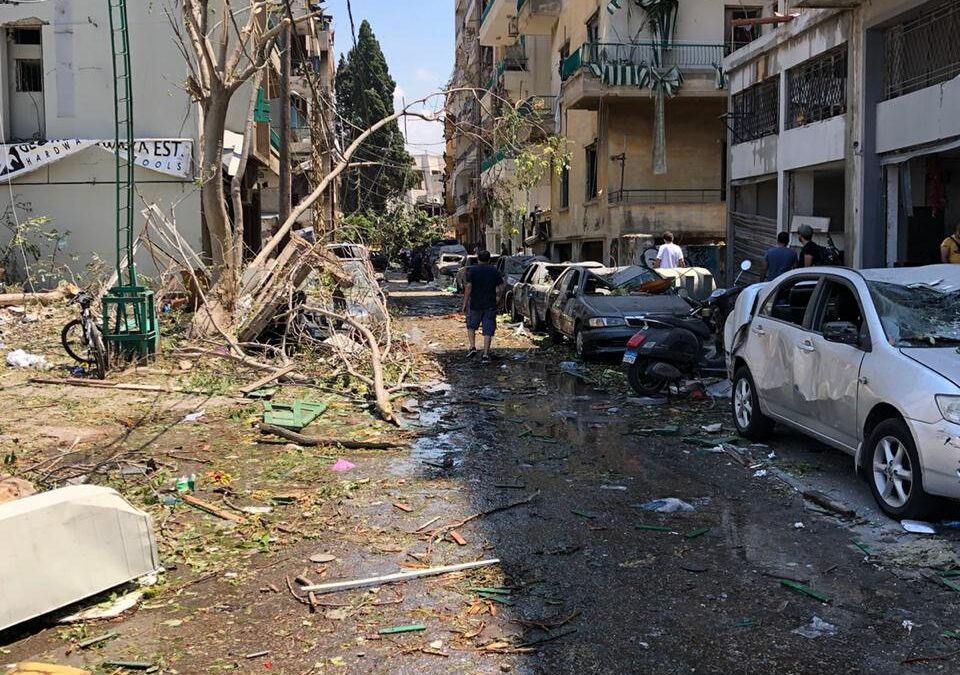
Aug 7, 2020 | News
The ICJ deplores the explosion at Beirut’s port district on 4 August 2020 that caused a large number of fatalities and casualties and calls for the prompt establishment of a special, independent, impartial and transparent mechanism to investigate the devastating blast with a view to ensuring accountability and redress for the victims.
The shockwave from the blast rippled across Lebanon’s capital, killing at least 157 people and injuring some 5,000 others, according to latest figures. The death toll is expected to rise as emergency services continue to search for dozens of missing persons under the debris of destroyed buildings. The Governor of Beirut estimates that the widespread destruction caused by the explosion has left some 300,000 people without shelter after their homes were rendered uninhabitable.
“Tuesday’s explosion has immeasurably compounded the suffering of a society already reeling from political unrest, prolonged economic mismanagement and a surge in COVID-19 cases,” said Said Benarbia, Director of the ICJ’s Middle East and North Africa Programme.
“Given the Lebanese legal system’s politicization and lack of independence and accountability, Lebanon should work with the United Nations to establish a special, independent mechanism to carry out the investigation in line with international law and standards with a view to establishing the facts, making recommendations for appropriate accountability measures, including criminal prosecutions if warranted, and for preventing such a catastrophe from happening again.”
According to international human rights law and standards, and specifically the Minnesota Protocol on the Investigation of Potentially Unlawful Death, the probe into the explosion must be prompt, thorough, independent, impartial and transparent.
While the Lebanese authorities have pledged to conduct a “transparent investigation” into the blast and mete out “severe punishment” to those responsible, given the Lebanese justice system’s systemic flaws and shortcomings, the persistent allegations of corruption, and a long-entrenched culture of impunity and de facto immunity of the country’s political leadership, the ICJ considers that the Lebanese authorities would not be capable of conducting such an investigation in a manner compatible with international human rights law and standards. The organization has extensively documented how improper executive influence and interference have continued to undermine the independence of the Office of the Public Prosecutor and of Lebanon’s judiciary. As a result, allegations of political corruption, chronic mismanagement and systematic abuses of power have not been investigated and have therefore gone unpunished over the years, eventually fuelling the 2019-2020 popular uprising against the government and the political system.
The ICJ has called on the Lebanese authorities to introduce and implement extensive legal and policy reforms to strengthen judicial independence and accountability in the country. None of these reforms have materialized.
“The independent mechanism should have a mandate to establish the truth, provide adequate, effective and prompt redress and reparation to the victims for the harm suffered, including through the award of compensation, and by ensuring that those responsible are held to account,” Benarbia concluded.
The ICJ further calls on the international community to support the establishment of such a mechanism.
The international community should also provide humanitarian aid and facilitate its delivery within the country ensuring that it reaches first the most in need and vulnerable among the population as they struggle to access healthcare, shelter, food and water.
The Lebanese authorities must be transparent and ensure the right of each individual to receive the necessary information on the potential health risks in the aftermath of the explosion, including as result of exposure to toxic fumes. Consistent with their obligations under international human rights law and standards to guarantee the rights to life and health, the Lebanese authorities must also take all necessary measures to prevent people from suffering additional harm.
Thus far, a number of Beirut port officials have been placed under house arrest pending the Lebanese authorities’ investigation into the explosion. With respect to this, the ICJ calls on the authorities to ensure due process and fair trial guarantees to persons deprived of their liberty who may eventually be charged with criminal offences.
Background information
President Michel Aoun and Prime Minister Hassan Diab have linked the blast to a stockpile of approximately 2,750 tons of ammonium nitrate, which had been stored in a waterfront warehouse at Beirut’s Port district for at least six years. The circumstances surrounding the ignition of the highly combustible material, however, remain unclear.
Furthermore, reports indicate that customs officials overseeing the ammonium nitrate’s storage at the warehouse contacted Lebanese officials, including members of the judiciary, on multiple occasions to alert them to the danger posed by such storage and to seek guidance on how to deal with it, but their repeated calls were ignored.
The explosion strikes Lebanon as it grapples with multiple crises, including the COVID-19 pandemic, and against the backdrop of an ongoing popular protest movement against rampant corruption, dysfunctional institutions and sectarian power structures, in addition to an acute State-induced socio-economic crisis that has eroded living standards and left many destitute and literally hunger-stricken. Successive governments and legislative authorities have consistently failed to effectively address these hardships and institute comprehensive and necessary reforms.
Contact
Said Benarbia, Director of the ICJ Middle East and North Africa Programme, t: +41 22 979 38 17; e: said.benarbia(a)icj.org.
Download
English (PDF)
Arabic (PDF)

Aug 7, 2020 | Advocacy, Agendas, News
On 6-7 August the ICJ co-hosted a symposium on threats to judicial independence in East and Southern Africa.
The event was held with the collaboration of the Africa Judges and Jurists Forum, the Kenyan Section of the International Commission of Jurists Kenya Section, Open Society Initiative for Southern Africa, Southern Africa Development Community Lawyers Association, Malawi Law Society, Pan African Lawyers Association, East Africa Lawyers Association and the American Bar Association.
Recent actions taken to undermine judicial independence in East and Southern Africa include proposed constitutional amendments, executive interference with the functioning of the Judicial Service Commissions and verbal as well as physical threats against judges.
Participants in the symposium included judges, lawyers, academics and civil society representative. ICJ Commissioner and former Chief Justice of Kenya Dr Willy Mutunga, and Professor Jill Ghai of Katiba Institute delivered the key note addresses.
Dr Willy Mutunga speaking to challenges of judicial independence in the political context of Kenya in his keynote address, said “I believe that the independence of the judiciary… is about the integrity of the judicial officers… Building peoples’ confidence in the judiciary and the judicial officers depends on the integrity of the institution and its judicial officers and staff.”
In her address, Professor Jill Ghai evaluated various ways in which independence of the judiciary is undermined, taking into account examples from various countries.
“We must not relent in letting the Executive know that we are watching whenever there are attempts to undermine the judiciary,” Ghai said in closing.
ICJ Secretary General Sam Zarifi that judicial independence was facing genuine threats, not just in Africa but throughout the world.
“The issue of judicial independence has been at the heart of the ICJ’s work for the last 70 years almost… We have been defending the rule of law and human rights. For both of those the independence of the judiciary is absolutely essential,” Zarifi said.
On the second day of the symposium, participants into four groups discussed the nature of challenges and weaknesses in the Executive-Judiciary relations, litigation as a strategy for protecting judicial independence, strategies for increasing social and political activism in defence of judicial independence, and the prospects and strategies for regional and international advocacy in the age of COVID-19 respectively.
In his closing remarks, outgoing ICJ Regional Director Arnold Tsunga flagged Malawi as a recent case study where the judiciary had demonstrated its independence when the Constitutional Court nullified the 2019 presidential election results, citing widespread irregularities.
Watch the proceedings of the symposium here:
Welcome and keynote address
Closing remarks
Contact:
Justice Mavedzenge (ICJ Legal Advisor) t: +27793889990 e: justice.mavedzenge(a)icj.org
Shaazia Ebrahim (ICJ Media Officer) t: +27716706719 e: shaazia.ebrahim(a)icj.org

Jul 31, 2020 | Agendas, Events, News
The ICJ, together with the Global Initiative on Economic, Social and Cultural Rights (GI-ESCR) and the Right to Education Initiative (RTE), held webinars on 24 and 31 July.
The discussions explored The Guiding Principles on the Human Rights Obligations of States to provide public education and to regulate private involvement in education (Abidjan Principles) and their application in the context of COVID-19.
The webinars focused respectively on public education and private education.
Participants included judges and representatives of civil society organizations from Kenya, Uganda, South Africa and Sierra Leone.
“The aim of the conversation in these webinars is to better understand the problems facing civil society and judiciaries in the four countries in ensuring the protection of the right to education in the context of Covid-19 and the increased privatization of education,” said ICJ Commissioner Justice Jamesina King of Sierra Leone.
The Abidjan Principles, based in large measures on existing international law and standards, were developed by leading international experts and adopted in 2019.
They clarify and set out elements of State obligations to uphold the right to education and related standards in both public and private educational settings.
Participants were able to deepen their understanding of the Abidjan Principles as well as the increased pressure placed on education systems across Africa as a result of COVID-19.
“COVID-19 has dramatically exacerbated already well-known issues in the realization of the right to education” and the “divide in quality of access to education between public and private sectors,” added Justice King.
“Private actors in particular… have been reported to have capitalized on the pandemic to extend their business in the education sectors.”
Participants raised concerns about the use of public funds to support private actors in education, an issue which is addressed by the Abidjan Principles.
Ashina Mtsumi from the GI-ESCR, summarized the Abidjan Principles and emphasized that “States’ first priority should be public education, as there is no obligation for states to fund private actors in education.”
A theme emerging from the discussions was the important role of the State in regulating private actors in education in the context of the global pandemic. Judges discussed the role of the judiciaries in their respective countries in ensuring the protection of the right to education.
“Can courts force private institutions to continue [operating] or even reduce school fees as an incidence of the right to education?,” Justice Joel Ngugi of Kenya asked.
Justice Ngugi also highlighted the need for governments to ensure that schools are safe for all learners in the context of COVID-19.
Judge Lydia Mugambe said that while in Uganda the pandemic had seen some private schools continuing with online learning, learners in public schools had had to depend on State provision of learning through newspapers and news stations which had not been sufficient. In the COVID-19 context, States must ensure that they continue to “require private instructional educational institutions to meet the minimum standards set by the State”, as indicated by the Abidjan Principles.
“The real problem is that our infrastructure is bad, the education system is bad and we have had a constitutional right to education since 1994 and I am embarrassed to say that the Covid-19 crisis has not exacerbated the problems, but has exposed the problems and have left no place to hide for years and years of government negligence,” said former Justice of the Constitutional Court in South Africa Zak Yacoob.
Representative from civil society organizations from all four countries emphasized the increasing risks introduced to the right to education as a result of privatization of education in Africa.
Watch the first webinar here.
Contact:
Khanyo Farisè (ICJ Legal Adviser) e: Nokukhanya.Farise(a)icj.org
Tim Fish Hodgson (ICJ Legal Adviser) t: +27828719905; e: timothy.hodgson(a)icj.org

Jul 28, 2020 | Advocacy, Cases, Legal submissions, News
The ICJ intervened today in the case of the potential surveillance by Polish secret services of Mikołaj Pietrzak, lawyer and chair of the Warsaw Bar Association, Dominika Bychawska-Siniarska et Barbara Grabowska-Moroz of the Helsinki Foundation of Human Rights, and Wojciech Klicki and Katarzyna Szymielewicz of the foundation Panoptykon.
The five applicants applied to the European Court of Human Rights claiming a violation of their rights to privacy and to an effective remedy because the system of secret surveillance and collection of metadata created by the Law amending the Law of the Police of 15 January 2016 and the Anti-Terrorism Law of 16 June 2016 does not provide sufficient guarantees for this rights’ protection.
In its third party intervention, the ICJ addressed (1) the application of the principles of prescription by law, necessity and proportionality, in circumstances when mass and targeted surveillance interferes with the right to respect for private life under Article 8 ECHR, in particular when it affects lawyers and human rights defenders; (2) the obligations of States under Article 8 and 6 ECHR to ensure respect for the confidentiality of lawyer-client relations and the principle of legal professional privilege.
The ICJ argued that secret surveillance, in particular where it interferes with the confidentiality of communications of lawyers and human rights defenders, and endangers lawyer-client privilege protected under Articles 8 and 6 ECHR, should be subject to specific safeguards and to particularly strict scrutiny of its necessity and proportionality.
The third party intervention can be found here: PIetrzak&HF_v_Poland-AmicusCuriae-ECtHR-Cases-2020-ENG

Jul 22, 2020 | Advocacy, Cases, Legal submissions, News
The ICJ and Amnesty International have submitted a joint third party intervention before the European Court of Human Rights in the case of Judges Mariusz Broda and Alina Bojara.
The case concerns the premature termination of their mandates as vice-presidents of the regional tribunal of Kielce in Poland. The two judges, that had been appointed to six-year terms in 2014, had their position revoked by the Minister of Justice in 2018.
The revocation was based on article 17.1 of the Law of 12 July 2017 modifying the Law on the Judicial System. This provision, presented and approved by the ruling Law and Justice Party (PiS), gave the Minister of Justice the power to revoke courts’ presidents and vice-presidents without justified grounds and with no possibility of appeal.
The two judges applied to the European Court of Human Rights alleging that they had been denied access to a tribunal to challenge the termination of their mandate .
In their third party intervention, the ICJ and Amnesty International analyze international standards on judicial independence, including as regards the role court presidents and vice-presidents, and the consequences of these standards for the right of access to court under Article 6.1 ECHR. The intervention also analyses the recent legislative and policy developments that have seriously undermined the independence of the Polish judiciary.
Read the full intervention here: Broda_v_Poland-AmicusCuriae-ICJ&AI-Cases-2020-ENG.









